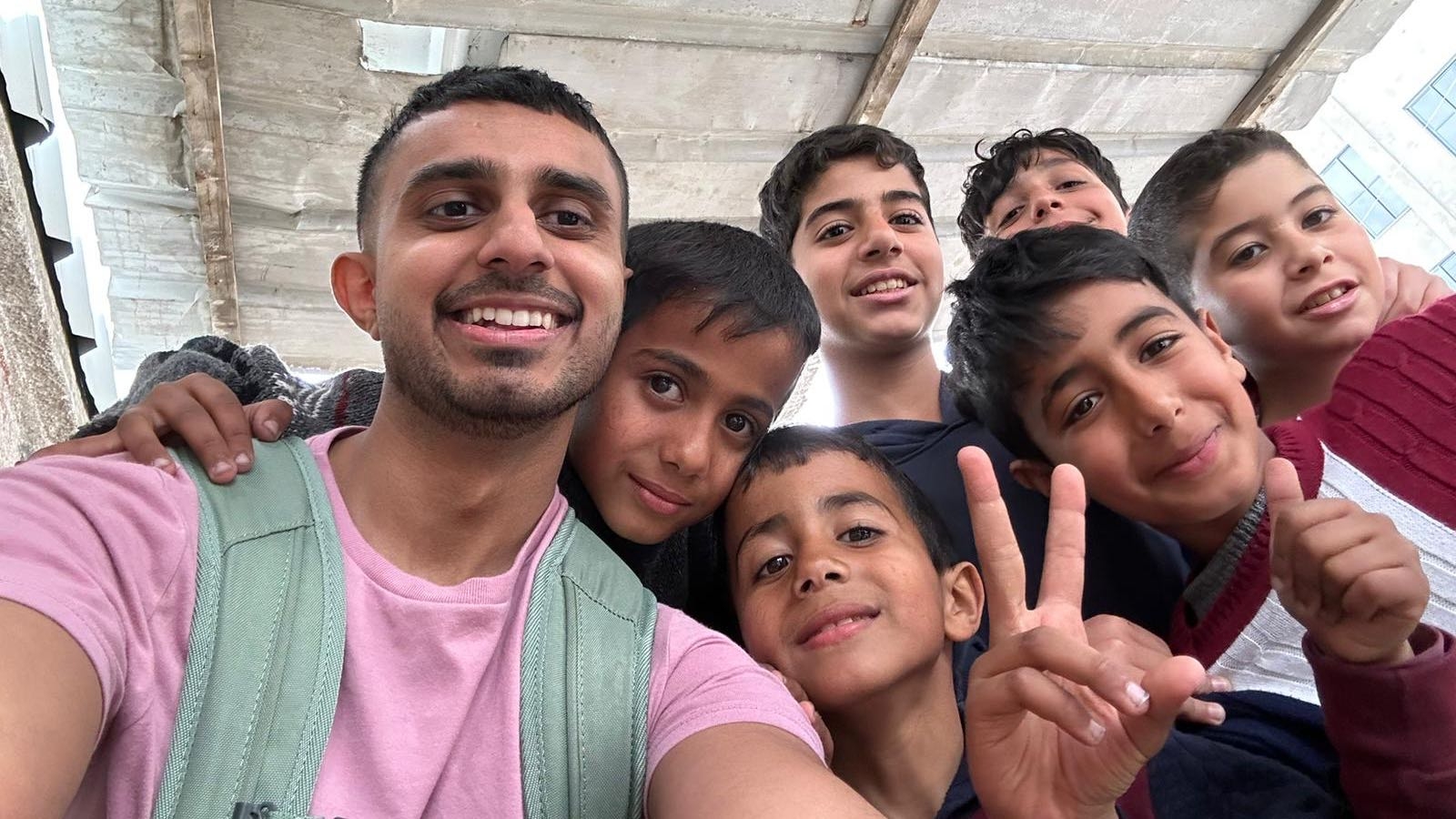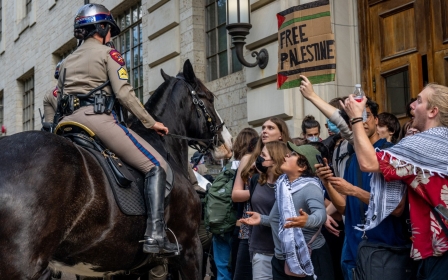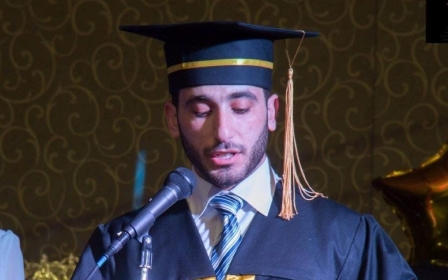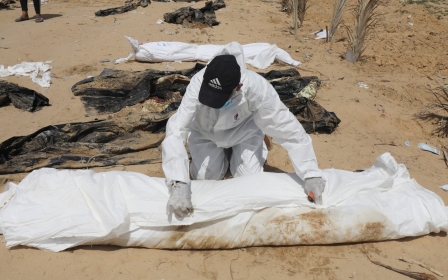'I want to go back': A New York nurse's journey to Gaza and back

Following Israel's declaration of war on Gaza, Rohaan Gill joined several WhatsApp groups in the hope of trying to find a way into the war-battered enclave.
The 28-year-old registered nurse, who's based in Brooklyn, New York, said he felt ashamed, frustrated and guilty and could not to sit idle while atrocities were unfolding every day.
"The whole point of me pursuing a career [in health care] is to use my skills to help our people," Gill, a Brooklyn native of Pakistani-origin told Middle East Eye.
"If I can't even do that, then what's the point?"
Since the Hamas-led 7 October attacks on southern Israel, more than 36,000 Palestinians have been killed by Israeli air strikes and shelling, according to Gaza's health ministry. Meanwhile, more than 80,000 have been wounded, with most of the victims being women and children.
New MEE newsletter: Jerusalem Dispatch
Sign up to get the latest insights and analysis on Israel-Palestine, alongside Turkey Unpacked and other MEE newsletters
Gaza is rife with combat-related deaths, but malnutrition, a "looming famine" and other complications from the forced displacement of hundreds of thousands of people compound the misery.
"We received reports that at least two children died due to the heat," said Philippe Lazzarini, the commissioner-general for Unrwa, the UN agency for Palestinian refugees. "What more to endure: death, hunger, disease, displacement, now living in greenhouse-like structures under scorching heat."
Unrwa said that Palestinians had less than one litre per person per day of water for drinking, washing and bathing, well under the international minimum standard of 15 litres.
'You don't go into Gaza without accepting that you could die'
- Rohaan Gill, registered nurse
One day in April, a group chat Gill was a part of, Doctors Against Genocide, put out a call for medical volunteers. Gill didn't hesitate and immediately signed up.
"I went to my mom after I signed up. I asked her if she'd be ok if they called me to Gaza," Gill said. "She told me 'It's your duty. You'd have to go and I would never be able to stop you.'"
So on 29 April, Gill left for the journey of a lifetime after getting the go-ahead. For a trip that was only meant to last a week, Gill ended up staying in Palestine for nearly a month.
Al-Aqsa hospital and the sound of bombs
Gill undertook the medical mission with an organisation called Glia. With him were about seven other volunteers who were part of a larger convoy of around 40 medical workers.
Gill spent most of his time in Rafah volunteering in a primary care clinic. More specifically, he would help treat victims with wounds: dressing changes, suturing and cleaning infections.
He also visited al-Aqsa hospital in Deir al-Balah, the same hospital that was hit by a strike on 31 March, which many blame on Israel.
Palestinian health officials said the strike hit several tents used by journalists and displaced Palestinians in the vicinity of the hospital, killing four people and wounding several, including five journalists.
"That's the hospital that you see on the news of people holding their bleeding children. We went there to see for ourselves what was going on. And we just ended up working there because that's how much help was needed," Gill said.
He said he witnessed countless people come in with injuries from explosives. He'd hear a bomb and then a whole bunch of people would rush into the hospital. There weren't any rooms available, so doctors and nurses would treat patients out on the main floors.
"There's just no space. There are people all over the hospital just lying down everywhere. Every inch of the hospital is taken. I think the capacity of the hospital is around 175. And there are maybe 1,200 people there. It was insane."
If there's an image that Gill, who used to work as a director of a youth centre in Brooklyn, cannot forget, it is the image of children in the hospital. Kids who had made it out of the rubble, but their entire families were gone. Kids with burns upon burns on their tiny lifeless bodies. Parents screaming for their children. "It all doesn't just go away," Gill said.
Gill went to Palestine expecting everything. But once he was there, experiencing it all first-hand was something he'd never forget. The sound of bombs, the sound of gunshots, the constant sound of drones. The first time he heard it, he asked: "What is that?" But to the doctors there, that sound was normal.
"When bombs get closer and closer, they sound different. And when they explode nearby, the entire building shakes. And I found it hard to refocus when that happened. But to the people who live here, they were able to refocus incredibly fast," Gill said.
Gill described one time when he was at the clinic in Rafah and heard the loudest sound he had ever heard. It was a roaring boom that lasted about 20 seconds. The building began to shake. After the boom, it got very quiet for a bit. And then he heard sounds like missiles coming toward the building.
"Of course, I am calm in my face, but my heart is pumping and my mind is racing," Gill said. After a while, Gill and the others went outside, and it turned out it wasn't a bomb or an air strike. It was a warplane that the Israeli military allegedly flew really low to break the sound barrier to scare everyone.
"It was the worst sound ever. This is what they do to torture people," Gill said. After the commotion was over, people came up to him and cracked jokes. Because to them this was all normal. But to Gill, this was the scariest thing he had ever experienced.
Israeli forces have been accused of employing psychological warfare on the 2.3 million residents of the Gaza Strip, to undermine their morale. This also includes methods such as dropping leaflets from planes and balloons, reminiscent of propaganda tactics utilised in past conflicts like the world wars and American campaigns in Vietnam and Iraq.
'Our tax dollars are funding this genocide. It's not okay to be neutral'
- Rohaan Gill, registered nurse
"You don't go into Gaza without accepting that you could die. Even if you do everything you are supposed to, like the World Central Kitchen staff, you could still be killed," Gill said.
"We drove through the same route they did. We were in the same area. It's completely dangerous. But you have to ignore the fact that you could die and just do your thing."
On 1 April, a World Central Kitchen convoy was attacked while travelling in a deconflicted zone after the team had unloaded over 100 tons of food aid at the Deir al Balah warehouse.
Seven members of its team were killed. The Israeli military later said the attack stemmed from "a serious failure due to a mistaken identification, errors in decision-making, and an attack contrary to the Standard Operating Procedures". The attack was globally condemned and is widely viewed as a violation of international law.
Having faith in God
But no matter how afraid he and others were, Gill found that the people of Palestine were the most resilient he had ever met. He believes it stems from their intense faith in God.
"Despite it all, they are still living life. They have so much hope and love. They would invite me into their homes and honour their guests. They still have nice haircuts and care about how they look. They are just human."
Gill said it is no longer okay to be neutral.
"Our tax dollars are funding this genocide. It's not okay to be neutral. We have to stand up against this. We have to humanise these people. They are just like us. They laugh like us. They eat like us. They breathe like us. They joke like us. We have to help them," Gill said.
Gill said he will never forget the people he met and the friends he made along the way. The nurses in Gaza taught him how to suture. They all got him gifts before he left. They taught him so much about hope and resilience - something he could never pay them back for.
"They've lost everything. And these people are suffering. But they're not depressed. They're not miserable. They are away from their homes but they are filled with so much hope," Gill said.
Ever since Gill has been back home in Brooklyn, his heart has been yearning to go back. He said he was a lazy nurse before. He still goes to protests. But on this trip, he found his purpose. He said he wants to gain more skills to help "my people".
"Once you're there, you don't want to leave. You want to stay and help in any way that you can. Leaving was hard. And it's harder here, too. In Palestine, even though I was surrounded by bombs and drones, at least I was there. Over here, all I feel is shame and guilt. I don't want to be here. I want to go back."
Middle East Eye delivers independent and unrivalled coverage and analysis of the Middle East, North Africa and beyond. To learn more about republishing this content and the associated fees, please fill out this form. More about MEE can be found here.





